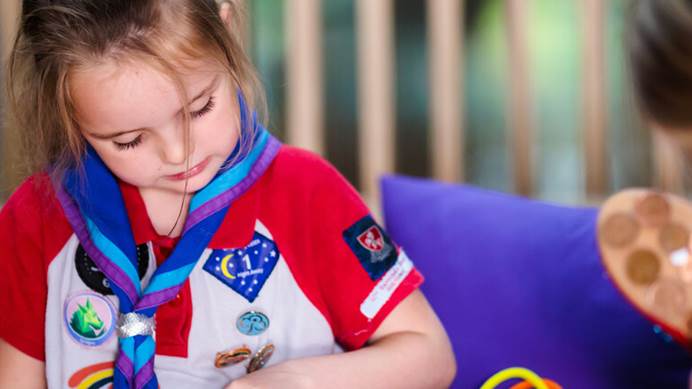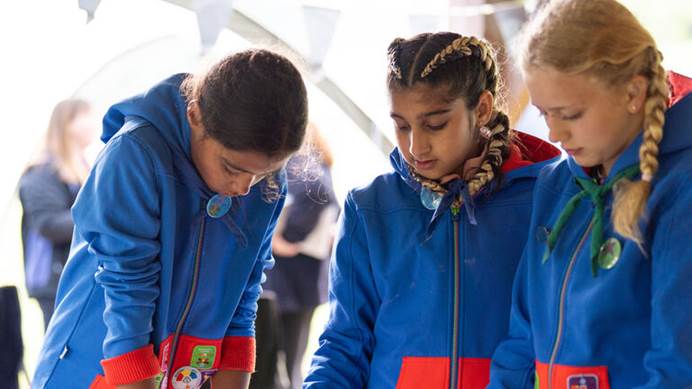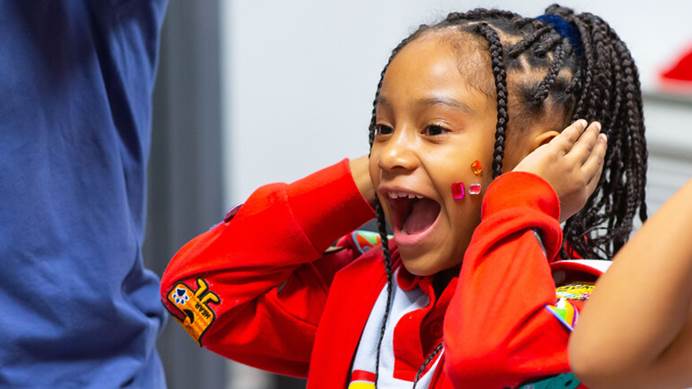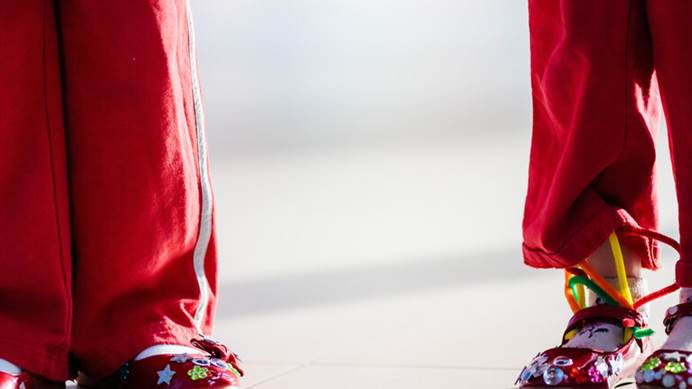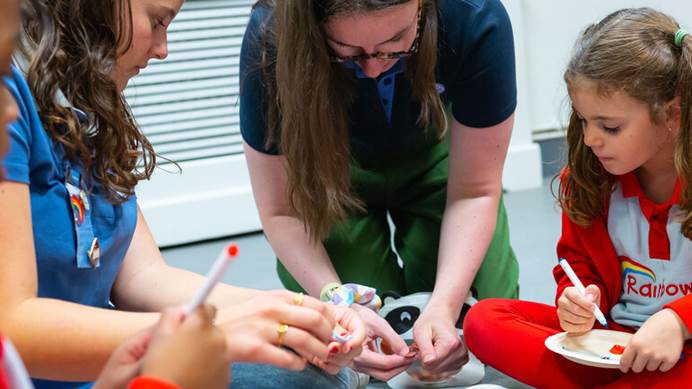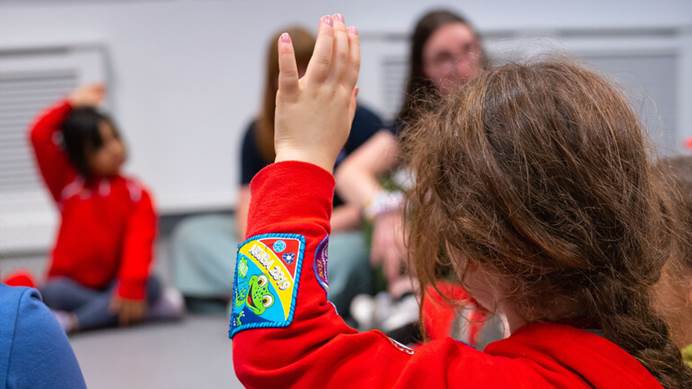Payments and expenses
This part of our finance procedures gives guidance on making and receiving payments and claiming expenses
This guidance is part of our finance procedures.
Last updated: 6 November 2024
Know how to deal with money coming in and going out.
Making payments
Whether you’re using cash, cheque, online banking or a debit card to make a payment from your guiding account, you must:
- Get approval from another signatory who isn’t related to you beforehand. This could be through meeting notes, where spending was agreed and assigned to you, or it could be with an email, text, Facebook or WhatsApp message between signatories. It’s important that this evidence is easy to find in future, as it will be required for the end of year review of the account. You could save the emails in a specific folder in your inbox, or screenshot and save or print the WhatsApp conversation.
- Keep receipts from all purchases made, and share these with whoever is in charge of keeping the accounts. This can be done electronically. For, example, you could send a photo of a receipt by email.
Check the headings for specific payment methods below for additional requirements.
Using debit cards
If you'd like to use debit cards for your guiding account, decide who in your team should have one and follow this best practice advice.
- Debit card users must be signatories for the bank account the card is linked to, but it’s up to your leadership team to decide how many of the signatories should have a debit card.
- It may be that one card for the unit or level is enough. Each debit card holder will be given their own PIN and personal security details and will be able to operate available services on their own.
Volunteers must:
- Keep the debit card safe and secure.
- Agree limits on spending with the other signatories on the account. You may also be able to place a spending limit on the card.
Volunteers must not:
- Allow anyone else to use the card, PIN, or personal security details, including other volunteers.
- Use the card to make personal purchases. If the card is used in error, you should contact whoever is in charge of keeping the accounts and arrange to pay back money owed.
- Use their card to obtain cash back at a store. This is to stop the card being used inappropriately.
- Store their debit card on their mobile device, such as through Apple Pay or Google Pay. This is to stop the card being used in error.
- Save their card details on any websites, or in their browser. If possible, use the option to checkout as a guest when paying online.
- Withdraw cash unnecessarily.
Instead of using a debit card, your unit or level may prefer to use a prepaid card. We recommend using one of these when travelling overseas, but they can also be used for day-to-day purchases in the UK. You can find out more about prepaid cards on our managing finances for overseas trips page.
If your debit card is lost or stolen you should follow the advice given by your bank. Usually this will involve informing them as soon as possible by phone or through their mobile app, so that the card can be cancelled and a replacement sent to you. Some banking apps allow you to temporarily freeze your card until you find it. You should also make sure to inform the other signatories on the account and anyone else involved in finances for your unit or level.
Using cheques
At least 2 signatories who are unrelated to each other must sign a cheque, and they should always see the relevant invoice before signing. Your bank mandate may require further signatories to sign cheques.
You must never sign blank cheques for another signatory to fill in and sign.
Paying for the annual subscriptions
You can now pay the annual subscription invoice by card, so you may choose to make the payment using the debit card linked to your unit.
The finance policy states that you must minimise the use of personal money for guiding costs, so we don’t recommend that personal debit or credit cards are used to pay the annual subscription invoice. If they are, you must ensure that there is a record of this agreement before the payment is made. Make sure that the full cost is repaid to the volunteer immediately, and this is recorded accurately in the accounts.
Using dual authorisation
Lots of banks now offer online banking with dual authorisation. This is a security setting that means 2 different signatories will need to authorise all payments or any payment above a certain limit that you set.
Dual authorisation works by one of the signatories logging into the account and setting up a payment. A second signatory then logs in and authorises it. The payment will be made once the second signatory authorises it. The first person can see the payment in the list of ‘awaiting transactions’ but won’t be able to do anything more. The second person gives the final authorisation to the bank.
Where a unit is run by multiple members of the same family the authorisation has to come from someone from outside the family.
If dual authorisation is set up, you won’t need to provide evidence that each transaction was agreed in advance as part of the end of year review process. This could save you a lot of admin, so if your bank offers dual authorisation as an option, we highly recommend it.
If it's not available, transactions made through online or mobile banking must be agreed in advance by another signatory and there must be evidence for this agreement. This could be through meeting notes, where spending was agreed and assigned to you, or it could be with an email, text, Facebook message or WhatsApp message between signatories. It’s important that this evidence is easy to find in future, as it will be needed for the end of year review of the account.
You might want to think about which form of communication will be the easiest to share with the independent reviewer. Emails can be easily printed out, but texts and WhatsApp conversations may need to be screenshotted and pasted into a document before printing.
Receiving payments
Direct payments into bank accounts
Parents and carers can make online payments directly into your unit or level bank account if your bank allows this. This is a great way to avoid dealing with too much cash.
You'll need to give them these details about your account:
- Name of the bank.
- Name that the account is under. This should be the unit’s name as it appears on GO.
- Bank account number. This is an eight digit number.
- Sort code. This is a six digit number, usually in the format 00-00-00.
- A suggested reference for their payment, for example, their child's name and what the payment is for.
When sharing bank details, think about whether your messages are encrypted. Encryption makes messages more secure and less likely someone who shouldn’t gets access to the information. WhatsApp and Facebook Messenger use encryption, but Facebook groups don’t.
If a parent or carer asks for confirmation of a payment, you could give them a printed or handwritten receipt. Or, send them an email or a text once the payment has been received into the unit or level bank account. Providing acknowledgement or a receipt can help to avoid any disputes about money being paid.
Other ways to receive direct payments into your bank account are using card readers and account-to-account payments, which let you receive these payments in person.
Card readers, like those used in restaurants or by small businesses, can be bought or rented. Many charge a percentage fee for each payment made. There's lots of options out there, so have a think about whether the cost is worth the benefit.
Account-to-account payments, which are sometimes called A2A payments, transfer money directly between accounts. They can be set up to happen automatically and instantly. Account-to-account payment providers will charge a fee per transaction or per month, so you’ll need to you consider whether the cost is worth the benefit and whether it would work well for your unit.
If you’re charged for transferring payments or a transaction fee for the use of a card reader or account-to-account payment, you must record the total donation amount as income. And, record the charges in your accounts as expenditure.
Receiving cheques and cash
Some parents and carers might prefer to make payments with cash or by cheque. You should try to accommodate this where possible. When you get money in this way, make sure it's processed properly.
When given cash, you need to:
- Record details of who has given you the cash, what it’s for, and how much it is. Note this down straight away so you don't forget any details and keep it together with the cash to avoid any confusion later on. You could ask parents or carers to bring money in labelled envelopes to make this easier.
- If a parent or carer asks for confirmation of their payment, you could give a printed or handwritten receipt, an email or a text. Providing acknowledgement or a receipt can help to avoid any disputes about money being paid.
- Keep it separate from your personal money. You could have a separate wallet or a lockable cash tin just for unit money to make sure it never gets mixed up.
- Keep the cash safe and secure until you can bank it. Make sure no one else in your household can access it, even accidentally.
- Pay it into the unit or level bank account as soon as possible. Depending on which bank or building society your account is with, you might be able to pay in cash at a post office branch.
When receiving cheques, be sure to:
- Confirm that the cheque is made out to the correct name for your unit or level account. This should be the name as it appears on GO.
- Record details of who has given you the cheque, what it’s for, and how much it is. Make a note of this straight away and keep it together with the cheque to avoid any confusion later on.
- Keep the cheque safe and secure until you can bank it.
- Pay it into the unit or level bank account as soon as possible. If you use an online banking app, you may be able to deposit cheques by taking a photo in the app.
Expenses
Volunteering with Girlguiding shouldn't leave anyone out of pocket. You might spend some of your own money on expenses when volunteering, and it’s important you claim this back.
These expenses are anything you’ve paid for with your own money when carrying out your volunteering role. It could be the cost of training materials if you're a trainer, or the money you spend on travel for an event. Any expenses relevant to unit or level activities or events should be budgeted for and paid from unit funds. And expenses should be claimed in line with the finance policy.
If you’re claiming expenses to be paid from a level that isn’t your unit, check if they have their own guidance you need to follow for claiming expenses. For example, if you’re claiming travel expenses for a county event that will be paid by the county, check if they have their own guidance before you spend any of your own money.
Claiming expenses
To claim expenses, you must keep all relevant receipts, travel tickets, invoices and bills. You can’t claim expenses from a credit or debit card receipt, because it does not itemise what was bought. You also can't claim for interest on a personal credit card.
- When you start your role, check the procedure for claiming expenses with your local leadership team or commissioner.
- You must have expenses agreed in advance to avoid a situation where a volunteer is left out of pocket. It might not be possible to know the exact amount of money that will be spent ahead of time, but you can agree a sensible estimate. Make sure that both the volunteer and the unit or level has enough funds to cover the spending.
- You must use an expense claim form to keep track of your receipts and make sure you’re claiming back everything you’ve spent. Download an example expense claim form (Word, automatic download, 50 KB).
- Try to claim your expenses as soon as possible. It’s helpful for you and your unit if you do it immediately, or at least once a term.
- It’s good practice to claim all expenses in the same year that they’re incurred. This way your unit or level will have budgeted for all expenses.
- If the time it takes to get your expenses paid back could impact on your personal financial situation, let your local commissioner know. It may be possible to get an advance when you know you’ll be paying expenses. In some areas, the county or country/region office may also be able to pay on your behalf. Speak to your local commissioner for more information.
Claiming expenses without a receipt
- Sometimes it might not be possible to provide a receipt or invoice. When this happens, you must use an expenses claim form to record the amount and the reason behind the spending. You should explain why a receipt or invoice wasn’t cost. This can be used as a receipt. And when your item arrives, there might be a printed copy in the package that you can use.
- Printer ink and paper – if you’re using your home printer to print a lot of guiding materials, the costs can add up. Try to make a reasonable estimation for the cost of what you have used and explain how you reached the amount on the claim form.
- Phone use – you may be able to download or request a statement showing your calls and the costs. You could also check the price per minute on your provider’s website. Include this information with your claim form. Girlguiding won’t make a contribution to monthly fixed phone charges.
Donating your expenses
If an adult member doesn’t want to claim their expenses, ask them to make a claim with the relevant receipts, and then donate their expenses back to the unit. If they’re a taxpayer, ask them to complete a Gift Aid declaration so that Gift Aid can be claimed on the value of the donation.
In order to claim Gift Aid, the donation of expenses must be made in line with HMRC’s guidelines:
- The unit or level must pay the expenses owed to the volunteer. Ideally this should be done by cheque or bank transfer, so there’s a clear audit trail for the payment.
- The adult member can then make a donation back to the unit or level for the same amount, or just part of it. Again, this should ideally be done by cheque or bank transfer. If expenses are donated in cash make sure there’s a clear record of this.
- The donation should be recorded in your accounts separately to your day-to-day income and expenditure. If you’re using the unit accounts pack, you can record this on one of the events tabs.
Approving expenses
- Another signatory of the bank account needs to authorise all expenses, check that all receipts are included, and the claim is correctly added up. This will help when completing your end of year accounts.
- Where a unit is run by multiple members of the same family, it's essential that authorising expenses is done by a signatory outside of the family.
Grants for advisers and coordinators
Some counties, countries and regions also have grant schemes to help advisers and coordinators with general costs during the year. Check with your commissioner to see if a grant scheme exists in your area. If your only guiding role is as an adviser or coordinator, your membership of Girlguiding may be paid for you by your division, county or country or region as appropriate.
